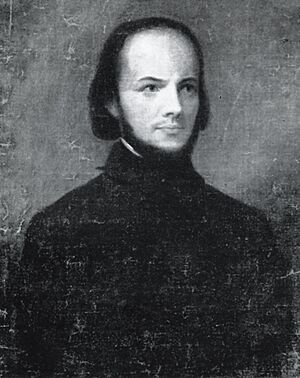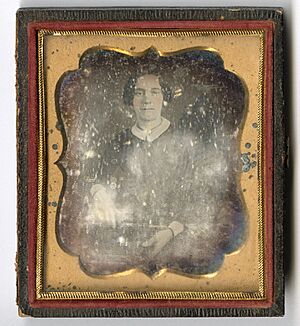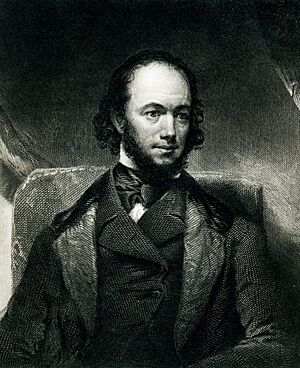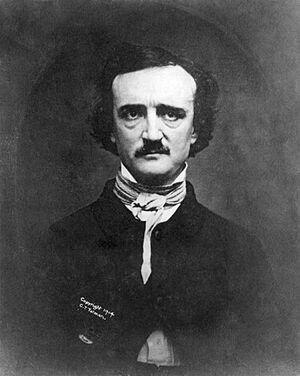Rufus Wilmot Griswold facts for kids
Quick facts for kids
Rufus Wilmot Griswold
|
|
|---|---|
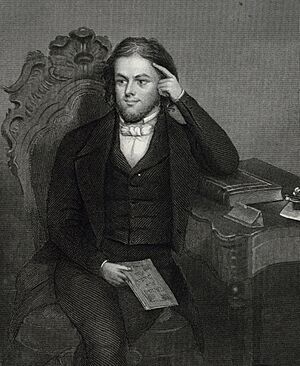
1845 engraving
|
|
| Born | February 13, 1815 Benson, Vermont, U.S. |
| Died | August 27, 1857 (aged 42) New York City, U.S. |
| Pen name | Ludwig |
| Occupation |
|
| Signature | |
Rufus Wilmot Griswold (February 13, 1815 – August 27, 1857) was an American editor, poet, and critic. He was also known for collecting and publishing poems in large books called anthologies. Born in Vermont, Griswold left home when he was 15 years old. He worked as a journalist, editor, and critic in cities like Philadelphia and New York City.
He became well-known in the literary world, especially after his 1842 collection The Poets and Poetry of America. This book was the most complete collection of American poems at the time. He continued to create new versions and similar anthologies throughout his life. Many writers hoped to have their work included in his books, even though they often found Griswold to be a difficult person. Griswold was married three times. His first wife died young, and his second marriage ended in a public divorce. His third wife left him after the previous divorce almost got canceled.
Edgar Allan Poe, whose poems were in Griswold's anthology, wrote a review that questioned some of Griswold's choices. This started a rivalry between them. The rivalry grew when Griswold took over Poe's job as editor of Graham's Magazine, earning more money than Poe did. They also competed for the attention of poet Frances Sargent Osgood. They never became friends again. After Poe's mysterious death in 1849, Griswold wrote a very critical article about him. Griswold claimed he was chosen to manage Poe's writings and spent years trying to damage Poe's reputation.
Griswold thought he was an expert in American poetry. He was one of the first people to suggest that American poetry should be taught in schools. He also supported new laws to protect copyrights, speaking to the government for publishers. However, he sometimes used other people's copyrighted work without permission.
Contents
Life and Career of Rufus Wilmot Griswold
Early Life and Beginnings
Rufus Wilmot Griswold was born on February 13, 1815, in Vermont. He grew up in a strict religious family. He was the twelfth of fourteen children. His father was a farmer and shoemaker. When he was 15, Griswold left home, feeling like a "solitary soul."
He moved to Albany, New York. Later, he tried to join the Rensselaer Polytechnic Institute in 1830. However, he was not allowed to take classes after trying to play a prank on a professor.
First Steps in Writing and Marriage
After working briefly as a printer's helper, Griswold moved to Syracuse, New York. There, he started a newspaper called The Porcupine with some friends. This paper was known for its harsh criticism of local people.
In 1836, he moved to New York City. He met Caroline Searles, and they married in August 1837. Griswold worked as an editor for different publications in New York. In 1837, he became a Baptist clergyman, but he never led a church.
Griswold and Caroline had two daughters. After their second daughter was born, Griswold moved to Philadelphia in November 1840. He left his family and his job at Horace Greeley's New York Tribune. In Philadelphia, he joined the Daily Standard and became known as a harsh literary critic.
On November 6, 1842, Griswold visited his wife in New York. She had just given birth to their third child, a son. Three days later, after he returned to Philadelphia, he learned that both his wife and the baby had died. Griswold was deeply saddened. He traveled with her coffin by train and stayed by her side for 30 hours. He wrote a long poem called "Five Days" about Caroline, which was published in the New York Tribune.
Becoming an Anthologist and Critic
In 1842, Griswold published his 476-page book of American poetry, The Poets and Poetry of America. He dedicated it to Washington Allston. This collection included poems from over 80 authors. It had 17 poems by Lydia Sigourney, three by Edgar Allan Poe, and 45 by Charles Fenno Hoffman. Hoffman, a close friend, had twice as many poems as any other author.
Griswold managed many other anthologies too. These included Biographical Annual, Gems from American Female Poets, Prose Writers of America, and Female Poets of America. When preparing his anthologies, Griswold wrote to living authors. He asked for their suggestions on which poems to include and gathered information for their biographies.
In 1843, Griswold started The Opal, a yearly book that featured essays, stories, and poems. He also edited the Saturday Evening Post for a time. In 1844, he published a collection of his own poems called The Cypress Wreath. His poems often focused on death and sadness, with titles like "The Happy Hour of Death." Another poetry collection, Christian Ballads and Other Poems, came out in 1844. His non-fiction book, The Republican Court or, American Society in the Days of Washington, was published in 1854. This book described events during George Washington's presidency, mixing facts with old stories.
Second and Third Marriages
On August 20, 1845, Griswold married Charlotte Myers. She was 42, and he was 33. Their marriage was difficult, and they separated in April 1846. The separation agreement was like a divorce. After this, Griswold moved back to Philadelphia.
A few years later, Griswold moved back to New York City. He left his younger daughter with the Myers family and his older daughter, Emily, with her mother's relatives. He faced health challenges, including severe headaches and exhaustion. In 1849, he was saddened when his good friend Charles Fenno Hoffman was sent to a mental hospital.
Griswold continued to edit and write literary reviews for various publications. In 1855, he wrote a very critical review of Walt Whitman's book Leaves of Grass. He called it "stupid filth" and "beastly."
Griswold divorced Charlotte Myers on December 18, 1852. He married Harriet McCrillis shortly after, on December 26, 1852. They had a son, William, born in October 1853.
However, some people tried to get his divorce from Charlotte Myers canceled. This caused more trouble for Griswold. In 1853, a gas leak in his home caused an explosion and fire, and he was badly burned. His 15-year-old daughter, Emily, also had a near-fatal accident on a train. The attempt to cancel his divorce was dismissed in court in 1856. Embarrassed by all the public attention, Harriet McCrillis left Griswold and moved to Maine.
Later Life and Death
Griswold died from tuberculosis in New York City on August 27, 1857. A friend, Estelle Anna Lewis, suggested that the stress from public issues made his health worse. At the time of his death, his room had portraits of himself, Frances Osgood, and Poe. A friend found many documents in Griswold's desk that attacked other authors. His friend decided to burn them.
Griswold's funeral was held on August 30. His remains were buried on July 12, 1865, without a headstone. His large library of books was sold, raising money for a monument, but one was never built.
Griswold's Reputation and Influence
Griswold's book The Poets and Poetry of America was the most complete collection of its kind when it came out. It helped Griswold become very well-known in the 1840s and 1850s. The first edition sold out quickly. However, some people questioned his choices of authors. A British editor said that "with two or three exceptions, there is not a poet of mark in the whole Union." Still, the book was popular and continued to be published in new editions after Griswold's death.
Today, The Poets and Poetry of America is sometimes called a "graveyard of poets." This is because many of the writers included in it are now forgotten. One literary historian called the book a "collection of poetic trash."
In his time, Griswold was known for being difficult, stubborn, and sometimes unfair. Historian Perry Miller said Griswold was "about as devious as they came." Later collections like Prose Writers of America and Female Poets of America made him known as a powerful literary figure. Writers sought his approval, even though they feared his growing influence. Some authors openly shared their opinions about Griswold. One friend called him "one of the most irritable and vindictive men I ever met."
Griswold was one of the first to suggest teaching American poetry in schools. One of his books, Readings in American Poetry for the Use of Schools, was made just for this purpose. He claimed to have read every American poem published before 1850, which was about 500 books. A writer for Graham's magazine said, "Since the Pilgrims landed, no man or woman has written anything on any subject which has escaped his untiring research."
Publicly, Griswold supported laws for international copyright. But he often copied entire works when he was an editor. A fellow editor said that Griswold "takes advantage of a state of things which he declares to be 'immoral, unjust and wicked,' and even while haranguing the loudest, is purloining the fastest." Despite this, he was chosen to speak to the government in 1844 about the need for copyright law.
Relationship with Edgar Allan Poe
Griswold first met Edgar Allan Poe in Philadelphia in May 1841. At first, their relationship seemed friendly. Poe sent Griswold some poems for The Poets and Poetry of America anthology, saying he would be proud to have them included. Griswold put three of Poe's poems in the book: "Coliseum," "The Haunted Palace," and "The Sleeper."
In November 1841, Poe wrote a review of Griswold's anthology. The review was mostly positive, but Poe questioned why certain authors were included and others left out. He also said Griswold "unduly favored" writers from New England. Griswold had hoped for more praise. Poe privately told friends he was not very impressed by the book.
Their relationship became more strained when Griswold was hired to take over Poe's old job as editor of Graham's Magazine. Griswold was paid more and had more control than Poe did. Soon after, Poe began giving lectures called "The Poets and Poetry of America." In these lectures, Poe openly criticized Griswold.
Another reason for their bad feelings was their competition for the attention of poet Frances Sargent Osgood in the mid-1840s. Both she and Poe were married, but they openly flirted, which caused a lot of talk. Griswold liked Osgood very much and often went with her to literary events. He also strongly defended her. Osgood dedicated a collection of her poems to Griswold, showing her admiration and gratitude.
The "Ludwig" Obituary
After Poe's death, Griswold wrote an obituary (a notice about someone's death) using the name Ludwig. It was first printed in the New York Tribune on October 9, 1849, and was reprinted many times. In it, he claimed that "few will be grieved" by Poe's death because he had few friends. He wrote that Poe often wandered the streets, seemed moody, was easily annoyed, and was jealous of others. Griswold's true identity as the author was soon revealed. He later admitted in a letter, "I was not his friend, nor was he mine."
Poe's Writings After His Death
Griswold claimed that Poe had asked him to manage his writings after his death. He said Poe's aunt, Maria Clemm, agreed to this. A document exists where Clemm gives Griswold the power to handle Poe's works.
Griswold, along with James Russell Lowell and Nathaniel Parker Willis, edited a collection of Poe's works that was published in three volumes starting in January 1850. Griswold did not share the profits from this edition with Poe's family. This edition included a biography called "Memoir of the Author," which became known for being inaccurate. Many parts were made up by Griswold, using fake letters as proof. Those who knew Poe, like Sarah Helen Whitman and George Rex Graham, spoke out against it. In March, Graham published a notice saying Griswold had betrayed trust and was taking revenge on the dead.
Today, Griswold's name is often linked to Poe's as someone who tried to damage his reputation. However, some believe Griswold did not mean to cause harm. Even so, Griswold's efforts actually drew more attention to Poe's work. Readers were curious to read the works of a man described as "evil." Griswold's description of Poe and the false information he created appeared in Poe's biographies for the next 20 years.
Images for kids
 | Emma Amos |
 | Edward Mitchell Bannister |
 | Larry D. Alexander |
 | Ernie Barnes |


